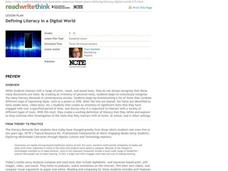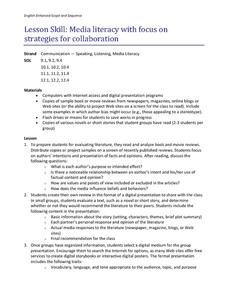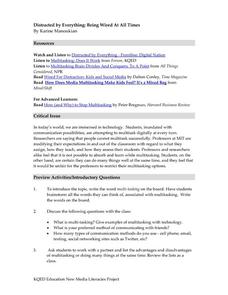ReadWriteThink
Defining Literacy in a Digital World
What skills are necessary to interact with different types of text? Twenty-first century learners live in a digital world and must develop a whole new set of skills to develop media literacy. Class members engage in a series of...
Curated OER
Bias and Crime in Media
Critical thinking and social justice are central themes for this resource on bias and crime in media. The class views and discusses an incisive PSA that highlights assumptions based on race. Small groups read newspaper opinion pieces...
Media Smarts
Bias in News Sources
As young consumers of media, it is important for high schoolers to explore concepts of bias and prejudice, and how they may be present in media. After discussing ideological messages that media can contain, individuals complete a warm-up...
Southern Poverty Law Center
Analyzing How Words Communicate Bias
Words are powerful ... can your class choose them wisely? Scholars evaluate news articles to discover the concepts of tone, charge, and bias during a media literacy lesson. The resource focuses on recognizing implicit information and...
Common Sense Media
Cyberbullying: Crossing the Line
Teach pupils to identify different forms of cyberbullying, including harassment, deception, “flaming,” and threats to safety, as well as how to handle a situation in which cyberbullying might be involved.
English Enhanced Scope and Sequence
Media Literacy with Focus of Strategies for Collaboration
Introduce your class to literary analysis with a series of activities that has them examine book and movie reviews. Groups then draft their own review of a text, select a digital medium, and craft a presentation.
Federal Reserve Bank
Financial Literacy Infographic Scavenger Hunt
A activity in personal finance can be the most valuable part of a high school education. Connect the basics of banking with informational reading skills in a activity that prompts teenagers to answer a series of questions based...
Fairbanks North Star Borough School District
Educator's Guide to Introducing Students to Google Docs
After learning how to create and name a Google Doc, individuals have the opportunity to share and collaborate with class members on a writing prompt assignment. Once grasped, students are encouraged to create a practice document on their...
Curated Video
Copyright
Introduce your class to the concept of copyright with a series of activities. Pupils first learn about copyright laws and fair use, putting their knowledge to the test with a quick categorizing task. They then watch a video and answer...
Curated OER
Digital Storytelling
Scholars of all ages can use the various tools of technology to construct and illustrate a story. Utilizing this resource, learners work with a partner to brainstorm and draft a story based on personal experience. They use computer...
Teaching Tolerance
Activism Online
People can make a difference in the world without leaving their homes. Using an eye-opening resource, scholars complete a handout as they consider the strengths and weaknesses of the Internet as a tool for social activism. Finally,...
Curated OER
Presentation (Electronic) Resources
Students explore the relationship and impact of information technology and digital media in the business arena. They create an interactive digital presentation which includes web links, links (buttons) to jump to different slides,...
College Board
AP® Computer Science: A Picture Lab Student Guide
How do you modify digital pictures? In this lab learners write methods that modify digital pictures. They how to traverse a two-dimensional array of integers or objects, and are introduced to nested loops, binary numbers,...
Curated OER
Coast-to-Coast Book Design-Part 1: What is a book?
In this first of four lessons on book design, students are introduced to the vocabulary of book design through the use of bookwalks and a non-linear PowerPoint presentation in game-show (Jeopardy!) format.
NOAA
What Little Herc Saw
See the underwater world through a different pair of eyes! Middle school marine biologists identify deep-sea organisms by examining images taken by an ROV from the Okeanos Explorer. After determining what creatures lie beneath the...
Curated OER
Digital Animal Presentations
First graders explore animals and digital presentations. They chose an animal and identify the physical traits of the animal. Students classify the animal using the physical traits. They create a presentation about their chosen animal.
Curated OER
The Electric Experience
Students investigate the effects of television and radio on culture. In this journalism lesson, students consider how electronic media has shaped journalism as they create timelines that feature the changes and compare and contrast print...
Curated OER
Our Computers, Ourselves: Imagining the Digital Lives of Authors and Characters
The guiding question for this lesson is "Do computers and their contents shape who we are?" Open with a selection of Apple's commercials to introduce stereotypes and people's relationships with their computers. Then, read the attached...
Common Sense Media
Talking Safely Online
What is the difference between online and real-life friendships? Pupils learn how to keep information private online and maintain their safety in various situations requiring online communication.
Curated OER
Using Primary Sources to Discover Reconstruction
Fifth graders discover how reconstruction had an impact on racial issues in the United States. For this Reconstruction lesson, 5th graders are introduced to primary vs. secondary resources and then rotate through stations to view...
Curated OER
Credible Sources on the Internet: What to Trust, What to Dismiss and When to Cite a Source
Wait, you mean researchers don't all use Wikipedia? Teach your class about intelligent research with a lesson about evaluating digital sources. The lesson starts with a quickwrite and includes vocabulary exercises and several...
Curated OER
Burr Airlines Flight to Asia: Building Inquiry Skills
What a wonderful way to explore this topic! Learners take an imaginary trip to Asia, take a visual tour, and formulate questions for a research project. As a final project, they create a travel brochure.
Curated OER
1900 America: Primary Sources and Epic Poetry
Using Walt Whitman's Song of Myself and Hart Crane's The Bridge as models, class groups first craft their own epic poems for 1900 and, using primary sources, create a multi-media presentation that captures the sights and...
NPR
Distracted by Everything - Being Wired at All Times
This multimedia activity challenges media-savvy learners to look at the critical issue concerning the inundation of technology and multitasking in the classroom, and its effects on the education of themselves and others. The tasks...

























